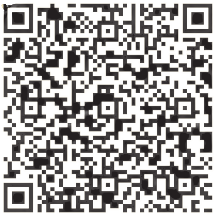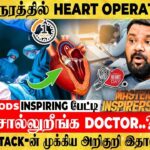 29 June, 2022
29 June, 2022
Sudden Cardiac Death
Heart disease can manifest through many symptoms such as cheap pain, shortness of breadth, palpitations, swelling of legs or even lack of energy. These symptoms can prompt the patient to get medical advice and thereby get appropriate treatment. However one cardiac symptom is ‘Sudden Cardiac Death’ which usually can only be prevented in the majority of circumstances and rarely treated. Yes, death indeed is a symptom of heart disease and can occur with no warning in certain heart conditions. SCD is not the same as a heart attack. Due to advancements in science and better understanding of the entity, Sudden Cardiac Death (SCD) is a medical (Cardiac) entity and has grown to become an important cardiac condition as it can be addressed and prevented with modern heart treatments. Very few centres in India have a dedicated program for SCD prevention.
Sudden Cardiac Death occurs almost always due to a heart electrical problem which can be due to abnormalities within the powerhouse of the heart or wiring systems of the heart. Infant the commonest mode of death due to any heart condition is ultimately due to a heart electrical problem. Although majority of sudden deaths are labelled due to ‘Heart Attacks’ which is due to blockage of the blood vessels of the heart, this is often not the case and is never proven unless a postmortem is performed. There are some kinds of sudden cardiac deaths due to specific heart electrical problems in whom postmortem examinations of such victims will be absolutely normal. This is because there is no way of diagnosing heart electrical problems after death, it is only possible to pick them up before death and prevent death. It can happen at any age depending upon the cause. Even children can suffer sudden cardiac death and this often due to an inherited heart electrical abnormality. Sadly this can present with no warning to the child or even adult for that matter.
The heart which is basically a pump by virtue of its functionality and works spontaneously because it gets power (electricity) from its own source called the Sinuoatrial node. Electricity from its own source is carried to various parts of the heart through the heart’s own wiring systems (Figure 1). Like a mechanical pump, the heart’s normal functioning is only possible when the heart’s electrical system is functioning normally. this is why, the commonest mode/cause of death due to any heart abnormality is an abnormal electrical problem with in the heart Figure 2 and Figure 3). It can range from very slow heart electrical impulses or very fast heart electrical impulses or due to short circuiting between the wiring systems within the heart. There are several heart electrical conditions. This sub-speciality or super-speciality that deals with heart electrics is called Cardiac Electrophysiology which is a highly complex and advanced area within cardiology and only a few centres have dedicated departments for cardiac electrophysiology. Out of the many heart departments Cardiology) within the speciality, this is the department that specialises and deals with sudden cardiac death prevention and sometimes treatment.

Figure 1

Figure 2

Figure 2
There are many causes for sudden cardiac death (SCD). These include:
- Previous Heart Attacks
- Poor Hear Function referred to often ‘low ejection fraction’ on heart scans
- Inherited (runs in families) Heart Muscle disorders
- Inherited Heart Electrical Disorders
- Acquired/Sporadic Heart Electrical Disorders
- Congenital (Born with) Heart Disease
- Drug (certain medicines) induced sudden cardiac death
The above list broadly covers the major reasons why sudden cardiac death occurs. However the actual mechanism or dysfunction that results in sudden cardiac death is a heart electrical abnormality and that is why this is best dealt by a heart electrician referred to as Cardiac Electrophysiologist.
A few decades ago, there was no way sudden cardiac death could be prevented. Often it was not possible to treat as it is usually very late before medical help can make a difference. Only a minority suffer sudden cardiac death whilst in hospital with specialist medical facilities around who are successfully treated. In the community Cardio-pulmonary resuscitation (CPR) if instituted in a timely manner by trained personnel can treat SCD but in reality this often does not occur. However with modern techniques and screening methods, patients at high risk of SCD can be picked up and treated successfully to prevent SCD. Across the world, leading multi speciality hospitals have a dedicated Department for Cardiac Electrophysiology that deals with such patients as the subject is vast and requires highly trained specialists and specialist equipment to accomplish this. In recent years, this advanced sub-speciality within cardiology has developed extensively as evidence across the world has consistently shown that SCD can be prevented through screening and timely treatments in high risk patients. Such advances and treatments are believed to be one of the leading factors tor the increased life expectancy in many western countries.
Inspite of advances in this sub-speciality, there is no single drug that has been shown to treat SCD due to such heart electrical abnormalities. Interestingly there are also some drugs that can lead to heart electrical instability and thereby result in SCD. As SCD is primarily due to a heart electrical disturbance, cardiac electrophysiologists (heart electricians) prevent SCD or sometimes treat through interventions involving correcting such abnormal electrical systems within the heart. Heart rhythm disturbances due to short circuits within the heart can be studied and treated by getting rid of those short circuits through invasive procedures. These are not open heart surgeries. Almost all procedures are performed through key hole procedures and almost all patients are discharged home the next day. These are referred to as Electrophysiological Study and Catheter Ablation (Figure 4). This involves cauterising the abnormal circuits thereby leading to a cure
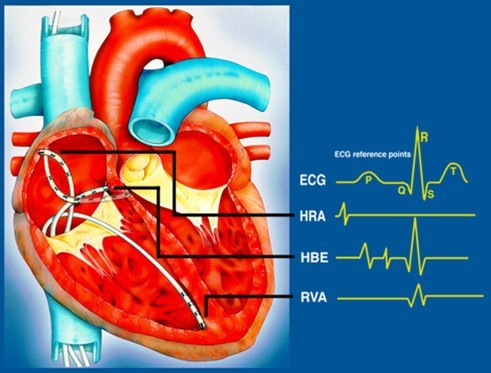
ELECTROPHYSIOLOGICAL STUDY
Figure 4a
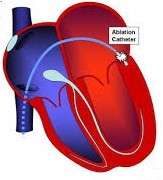
CATHETER ABLATION
Figure 4b
Some dangerous heart rhythms can only be treated by delivering a shock treatment refereed to as ‘Defibrillation’. It used to be only possible to deliver such treatments through specialised wards or mobile ambulance crews carrying such treatments. Now such devices have been miniaturised and can be implanted inside the patient. It is like a pacemaker but its functions are different. There are referred to a Implantable Cardioveter Defibrillator often abbreviated as ICD (Figure 5). ICDs are the only treatment available that can prevent SCD in patients with poor heart function and in patients with previous heart attacks. Infant ICD has been the only treatment thus far to prolong life in such patients. Not all patients require such treatments but only patients at high risk of SCD require such treatments. This can be evaluated by a cardiac electrophysiologist
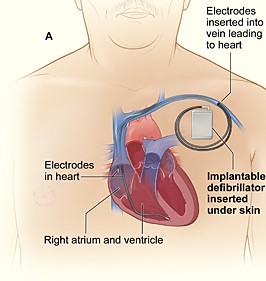
ICD WITHIN A PATIENT
Figure 5
In patients with poor heart function often referred to as heart failure, one of the major cause is abnormal electrical conduction within such hearts due to faulty wiring. Such patients benefit from a treatment which essentially involves rewiring the heart referred to as Cardiac Resynchronisation Therapy (CRT). again these are implantable devices similar to pacemakers but function differently. ICD function is often incorporated into such devices. There are several hundreds of thousands of patients across the world successfully treated with such devices that has made them fight against heart failure and prevent sudden cardiac death.
Take Home Messages:
Sudden Cardiac Death is a common symptom of heart disease that can often only be prevented
Sudden Cardiac Death is not the same as a ‘Heart Attack’
The commonest mechanism of sudden cardiac death or death from heart any heart abnormality is a heart electrical abnormality. It is not the same as a Heart Attack
Heart Electrical abnormality is best dealt with by a specialist ‘Heart Electrician’ referred to as ‘Cardiac Electrophysiologist’
Sudden Cardiac Death can be prevented through modern treatments and patients at high risk can be picked up in such specialist centres.
Sudden Cardiac Death can also affect children and are best dealt with in centres with dedicated ‘Paediatric Electrophysiology’




